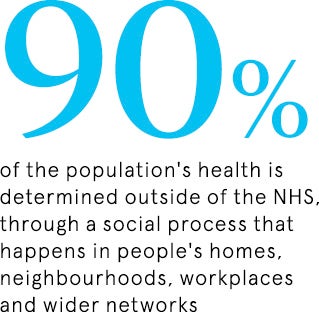Compared to a decade ago, people can now expect to spend more years in poor health. Worse still, while increases in life expectancy have stalled for many, they have declined for the poorest 10 per cent of women.
These shocking facts are detailed in the latest report from the Institute of Health Equality, entitled Health Equity in England: The Marmot Review 10 Years On.
Authored by Sir Michael Marmot, the report also demonstrates sharp inequalities: the more deprived the area the bigger the drop in life expectancy and years in good health. This is unprecedented in modern times.
This new analysis by one of the world’s most respected experts on health inequalities shows that, despite the intense focus on the NHS in successive elections, the government has not adequately prioritised health during the austerity years. It also begs the question: what is the government going to do next to reverse the worrying trend in health inequalities?
The NHS Long-Term Plan and recent consultation on the Prevention Green Paper, both of which were published under the current health secretary Matt Hancock, provide some steers. Encouragingly, there is a focus on health inequalities in both and there is every possibility that a break with current trends is possible.
The three Cs of health creation
We’ve known for a long time that healthcare provided by the NHS only accounts for approximately 10 per cent of a population’s health. The other 90 per cent of health is created through a social process that happens in people’s homes, neighbourhoods, workplaces and wider networks.
Marmot makes clear that most of the solutions lie outside the NHS and the job of reducing health inequalities depends on a wide range of organisations. These include local authorities, housing, police, education, patient groups and communities themselves, some of whom are doing some great work at tackling inequality. 
Indeed, the report emphasises that to tackle inequality, society needs to enable all children, young people and adults to maximise their capabilities and have control over their lives.
To be well, people need sufficient control over the circumstances of their lives, meaningful and constructive contact with other people and confidence to take action with others to make improvements. These are the “3Cs” of health creation.
When people have enough of the 3Cs, this helps to build protective factors that keep us as healthy and productive as possible. Conversely, insufficient levels of the 3Cs causes people to struggle in life and experience worse health outcomes.
Putting control in patients’ hands
This being the case, it follows that part of the role of those working to improve health, whether they work for the NHS or outside it, must be to enable people to increase levels of control and confidence, through meaningful and constructive contact with others.
At the same time, we must create and develop healthy and sustainable places and address wider structural causes of inequalities, such as insecure employment, poor-condition private homes and a welfare system that leaves people juggling their rent, food and fuel bills.
Making a sustainable and consistent impact on health inequalities over the next ten years is going to require a much better understanding of the complex process of “creating health” and a commitment to sharing power with communities.
There are many examples of communities creating their own health enabled by skilled professionals. Indeed, there is plenty of evidence, across sectors, to support and further develop health creation as a health discipline in its own right.
Now is the time for the government to develop and invest in a new cross-sector social health service to improve health and reduce health inequalities in the community. This needs to be everyone’s job – all sectors and communities themselves working as equal partners with devolved funding – and it needs to have health creation at its core.
The three Cs of health creation

